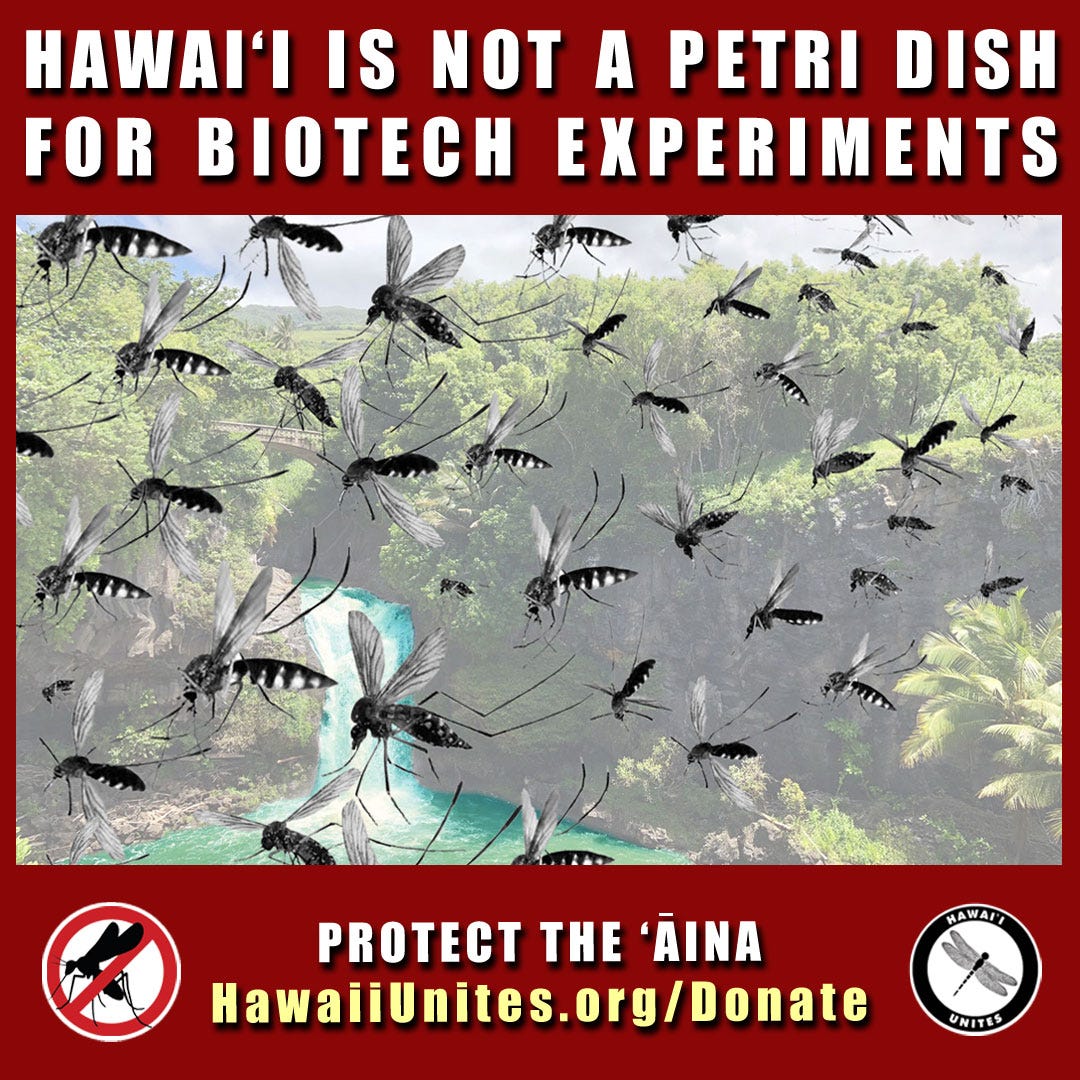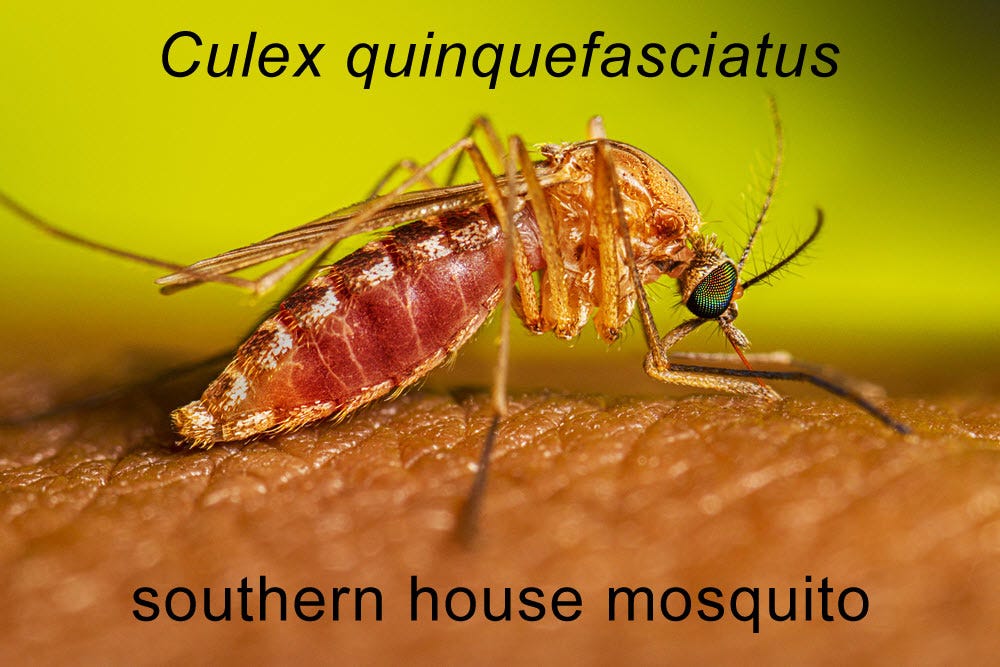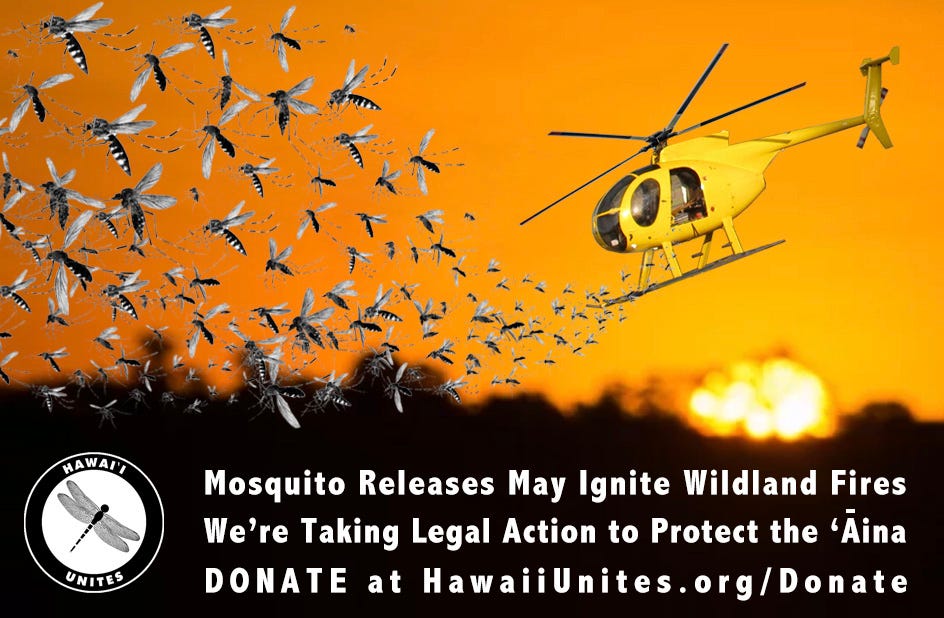Court Case to Stop Mosquito Releases: Opening Brief Filed in Our Appeal
This case is strong and can set a precedent here in Hawai‘i and worldwide
Last week, Hawai‘i Unites’ attorneys filed our opening brief in the Intermediate Court of Appeals. We’re seeking a ruling that our case to stop the mosquito releases on Maui and require an environmental impact statement be remanded back to the circuit court and go to trial. This case is strong and can set a precedent that will strengthen Hawai‘i’s environmental laws for all islands. The outcome can also impact the course of this biotech experimentation agenda globally.
In January, First Circuit Court Judge John M. Tonaki issued an order granting the State of Hawai‘i’s motion for summary judgment, which stopped our case against the State of Hawai‘i Department of Land and Natural Resources (DLNR) and Board of Land and Natural Resources (BLNR) from going to trial this month as scheduled. This also means that we didn’t receive discovery documents and admissions that were due the same week as the judge’s decision.
Several issues with the judge’s ruling are addressed in our appeal. Points of error include the court applying the wrong standard for reviewing the sufficiency of an environmental assessment, and the court granting summary judgment when there are material facts in dispute; failure to address additional material facts that suggest a project being carried out in a manner contrary to what was proposed, explained, and/or studied in the final environmental assessment; and the granting of summary judgment while failing to address both the undisputed failure of the DLNR to comply with Hawai‘i Administrative Rules in preparing its final environmental assessment (FEA) and the BLNR’s violation of Hawai‘i Revised Statutes (HRS) Chapter 343 in accepting the FEA.
“Defendant BLNR simply took Defendant DLNR’s word that the BNM [Birds, Not Mosquitoes] project would not have any significant impact and approved the FEA/FONSI [Finding of No Significant Impact] instead of taking a ‘hard look’ at the information presented and giving serious consideration to the impacts as required by chapter 343.”
HRS Chapter 343 is the Hawai‘i Environmental Policy Act (HEPA), modeled after federal law, requiring that government establish a system of environmental review of the impacts of proposed projects prior to implementation. This review process is designed to improve decision-making, ensure environmental concerns are given appropriate consideration, and increase public participation in the decision-making process. We believe the judge’s ruling in our case has undermined the HEPA process and set a precedent for allowing inadequate environmental review of future proposed experimental projects that could have significant impacts to the health of our islands’ people, wildlife, and fragile ecosystems. As stewards of the ‘āina and protectors of future generations, we’re standing up to challenge this flawed decision.
Serious concerns about the lack of study of the bacteria-infected mosquitoes, including those of tropical disease and vector expert Dr. Lorrin Pang, have not been properly addressed by these agencies. Concerns such as mosquitoes drifting on the wind to unintended areas (wind drift, biopesticide drift) have been disregarded entirely.
Our appeal addresses several facts in dispute in our case. Some of those facts include the lack of study of the risks and potential significant impacts of the project; the experimental nature of the plan; the introduction of foreign organisms into the islands; Wolbachia bacteria causing increased pathogen infection and disease-spreading capability in mosquitoes; conflicts of interest; lack of mitigation protocols for accidents such as horizontal transmission of Wolbachia and unexpected evolutionary events; population replacement; male mosquitoes transmitting pathogens and viruses to females through mating; EPA guidelines allowing for the weekly release on Maui of up to 3,103 lab-infected females that bite, breed, and spread disease; failure to disclose pathogen screenings; lack of documented biosecurity protocols; and the potential for the lab-infected southern house mosquitoes to transmit diseases to people and animals, including endangered native birds.
We also outline additional material facts learned since filing our complaint last year. Those facts center on the multi-agency partnership’s blatant deviations from the mosquito release methods approved in the FEA. These agencies have chosen to release the mosquitoes solely by helicopters rather than by drones for several months longer than was approved. Further, the helicopter longline release system described in the FEA is not the system being used. This appears to be causing the helicopters to fly closer to the tree canopy than the 150 to 200 feet AGL (above ground level) stated in that document. These deviations increase the potential for adverse impacts such as noise disturbances; nesting, breeding, and roosting disturbances; helicopter rotor wash; accidents and collisions; and wildland fires.
“Recent media coverage provides additional evidence that the helicopter release method is not the approved longline cable, but rather a short tube attached directly to the helicopter. Further evidence of increased safety concerns includes a hard landing helicopter accident in Kīpahulu Valley on February 20, 2024, reported to the Aviation Safety Network. Based on information and belief, this accident appears to be connected to the mosquito release project.”
Per our appeal, the transportation of hazardous materials, such as batteries for mosquito traps, “brings additional fire risks, as evidenced by an accidental fire cause by one of the ‘action packers’ containing a battery on September 22, 2023. This is important because there isn’t any discussion in the FEA on mitigating risks of hazardous materials used in mosquito monitoring.”
With the support of our community, Hawai‘i Unites is standing up for the protection of these sacred lands, our wildlife, and our health. These mosquito releases are a dangerous experiment. The scope and magnitude of the plan require comprehensive studies of the serious risks and potential significant impacts. Together, we can strengthen our environmental laws for the future of these islands as we challenge the failure of these agencies to follow HEPA and complete an environmental impact statement.
We’ll know more in the weeks ahead as our case moves through the appeals process. Hawai‘i Unites will need your help to continue moving this legal case forward. Please share our newsletter and consider making a tax-deductible donation today to support the work that we’re doing to protect the ‘āina.
Mahalo,
Tina Lia
Founder
Hawai‘i Unites
HawaiiUnites.org
Hawai‘i Unites is a 501(c)(3) nonprofit organization dedicated to the conservation and protection of our environment and natural resources. Your tax-deductible donations help us to fulfill our mission of honoring and protecting our sacred connection to the natural world.
Report a Mosquito Bite
The State of Hawai‘i and its multi-agency partnership Birds, Not Mosquitoes have been releasing bacteria-infected mosquitoes in East Maui and conducting pilot study releases on Kaua‘i since 2023. As part of our ongoing research and documentation, Hawai‘i Unites has been compiling reports from throughout the islands about unusual mosquito bite reactions. If you’ve been bitten by a mosquito and would like to report the incident, please complete our Mosquito Bite Incident Report.






In this linked article, I say that the LNRB seemd to be in a trance on May 10, 2023 when they voted the extra $12 million for the skeeter release. Don't want to be disrespectful, just sayin'.
https://www.rumormillnews.com/cgi-bin/forum.cgi?read=242940